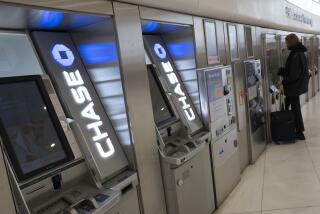Consumer Groups Push Banks Back to ‘Basics’
- Share via
We’re suddenly hearing a lot about “basic” banking-- minimum deposit, low-cost, low-service and limited activity checking accounts, instead of “premium” accounts offering the world to big depositors.
This should please consumer groups who want banks to welcome the poor as well, and who endorse two bills pending in Congress that would require all federally insured institutions to offer “lifeline service” that limits transactions but has no required balance, no maintenance fees or per-check charges.
Not unexpectedly, bankers oppose such legislation. They point out that such charity would be costly and maybe unnecessary, given no proof that the 20% of people without checking accounts really want them. They also point out that they already serve such people.
According to the American Bankers Assn., 75% of its 13,000 members let senior citizens bank free, and more than 50% don’t charge minors. Moreover, 45% of the largest banks and more than 60% of the smaller offer or plan to offer low-cost accounts--”basic banking” programs that require minimum balances of only a few hundred dollars to avoid all fees, or have monthly fees of less than $3 for lower balances.
These “basic” accounts--”the People Express of banking,” says ABA spokesman Kirk Willison--all cut the service while they cut the price, but beyond that, they vary widely . Almost none offer absolutely free checking. Almost all reward, or require, check truncation (canceled checks aren’t returned), use of automatic teller machines, or direct deposit of paychecks--all of which cut the bank’s handling costs.
Some, however, limit the customer’s activity in return for a special low monthly fee or required balance. Security Pacific National Bank’s “Discount” account, for example, permits 10 checks, two teller transactions, and unlimited ATM use for a maintained balance of $100. More typical, Camarillo Community Bank’s “Plain Wrap” account charges $2 a month for unlimited checks, and requires all withdrawals and deposits to be made on the ATM.
Other banks have lower monthly fees and “pay-as-you-go” charges for individual transactions. The 20-year-old “Suburban” account at Bryn Mawr Trust in Bryn Mawr, Pa., for example, charges customers a dollar a month and 25 cents a check, requires no minimum balance, and encourages use of ATMs for deposits.
There’s even a hybrid of the two methods. At California First Bank, deposits are free, check transactions 35 cents and ATM withdrawals 10 cents, and the customer can combine these transactions as he likes, required only to spend at least $3 a month.
Such accounts are meant to serve not just the poor but any customer “with minimal banking needs,” says California First spokesman Larry Boggs. A third of Bryn Mawr Trust’s relatively affluent customers choose the Suburban account, many of them college students, as are many of Security Pacific’s 100,000 Discount banking customers. Others are simply young people, “just starting out with their first checking account, and writing very few checks” says Becky O’Loughlin at Delta, Colo.-based Affiliated Colorado Bank, a quarter of whose customers choose a pay-as-you-go plan.
But they should be good for low-income customers, too, although a depositor’s income is harder to track. Their cost may be considerably lower than “regular” accounts, and lower yet than common alternatives--check-cashing operations, which charge up to 10% of a check’s value, and money orders or cashier’s checks, which cost up to $3.
They are also good for the banks, which can at least, says Bryn Mawr Trust President Robert Stevens, “make a charge on these that can pay back your costs.” Even better, many banks enjoy income from the unexpected balances these customers maintain ($500 is average for Security Pacific’s Discount customers) plus “some income from the account,” says Security Pacific Vice President Frank Sperling, “as well as the fact that it’s less expensive (for us) to maintain these accounts.”
Some of that income is punishment pay, and too harsh in the view of some critics. At Security Pacific, as elsewhere, customers going one check or one teller transaction beyond their limit are charged $3.50 that month, plus 25 cents for each debit of any kind.
The most common criticism of these accounts (apart from the fact that they’re not absolutely free) is that “there just aren’t a lot of them in urban areas,” says Ken McEldowney, director of Consumer Action in San Francisco, and those available are poorly publicized. Urban banks, explain urban bankers, can’t afford such accounts because they have higher overheads-- rent, personnel, advertising (even, says McEldowney, “losses on loans to Latin America”).
“Basic” bank accounts might even be acceptable to consumer advocates if they were ubiquitous. “They’re a positive development,” says a staffer of Rep. Mary Rose Oakar (D-Ohio), who’s sponsoring one of the bills that mandates lifeline service, “but because of the unique role of banks and their federal nexus, all institutions should offer them.”
More to Read
Inside the business of entertainment
The Wide Shot brings you news, analysis and insights on everything from streaming wars to production — and what it all means for the future.
You may occasionally receive promotional content from the Los Angeles Times.










